Belarusian-Russian integration is among the most popular topics in the Belarusian media. Kremlin narratives in Belarusian media – March 2021
We monitored and analysed 1092 articles (405 Belarusian and 687 Russian) published by leading media outlets in Russia and Belarus between March 1st and March 31st, 2021, concerning Belarusian-Russian relations. Monitoring focused on Russian publications referring to Belarus, Belarusian publications quoting Russian media outlets, and top-ranking articles indexed by Google News and Yandex News when searching for «Belarusian-Russian relations».
This report covers such topics as who borrowed content from whom, what information sources were used, and which references the media most frequently mentioned or quoted. Finally, we analysed and compared the key messages communicated by Belarusian and Russian media outlets.
Major findings
Lukashenka and state news agencies of Russia and Belarus were the most popular sources of information for the Belarusian and Russian media, respectively, for coverage of bilateral relations.
There was a surge in references to Dmitry Mezentsev, who gave interviews both as the outgoing Russian ambassador to Belarus and as the incoming state secretary of the Belarusian-Russian Union State.
Russian journalists continued to write about Sviatlana Tsikhanouskaya due to her political activity and new accusations against her by the Belarusian regime. Additionally, the completion of the investigation regarding her husband, blogger Siarhei Tsikhanouski, was announced.
Positive narratives regarding the future of the ongoing integration process dominated the Belarusian media space. Manipulative references to the shared history of Belarus and Russia were among the most popular narratives promoted.
In contrast, the most popular narrative strands in the Russian media included those recollections of the Belarusian regime’s oppressiveness to opponents and journalists.
Timeline of events in March 2021
On March 1st, Viktar Lukashenka was relieved of his duties as Assistant to the President of Belarus for National Security in connection with his election as the President of the National Olympic Committee on February 26th. He was awarded the military rank of «Major General in the Army Reserve».
On March 2nd, Aliaksandar Lukashenka stated that they did not discuss a Russian loan to Minsk at a meeting with Vladimir Putin on February 22nd in Sochi. Earlier reports indicated an agreement on providing Belarus with a Russian loan totalling USD 1 billion was signed on December 21st, 2020. The first tranche of the loan, USD 500 million, was disbursed on December 30th; the second half was expected in H1 2021.
On March 2nd, Lukashenka also offered to host Russian Air Force planes at Belarusian bases. He proposed joint patrols with Russian aircraft over the Belarusian territory, as in 2014 when the World Ice Hockey Championships were held in Belarus. “Give us the planes. As before, the Russians and Belarusians should operate them together. There are enough bases, no need to create new ones; why waste money? It is better to buy or build new planes,” Lukashenka said.
On March 2nd, final charges were brought against four associates of the ex-presidential candidate Sviatlana Tsikhanouskaya. According to the results of the investigation, they were charged with preparation for riots (part 1 of article 13, part 2 of article 293 of the Criminal Code) and preparation for the seizure of buildings and structures (part 1 of article 13, part 1 of article 292 of the Criminal Code). They will remain in custody until the trial starts. Tsikhanouskaya remains wanted, and the General Prosecutor’s Office was preparing a request for her extradition.
On March 2nd, the Defense Ministries of Russia and Belarus signed a five-year strategic partnership programme.
On March 2nd, Sviatlana Tsikhanouskaya said in an online interview with the Finnish Institute for Foreign Policy that Belarus will continue to have excellent relations with Russia. “We will have excellent relations with Russia. But they will be transparent and understandable for all parties. We are neighbours and will always be together; we must find ways to interact in the future,” she said.
On March 5th, Defense Ministers of Belarus and Russia Viktor Khrenin and Sergei Shoigu agreed to create three training centres for joint training of servicemen. The centres will be deployed in the Nizhny Novgorod and Kaliningrad regions of the Russian Federation and in the Grodno region of Belarus.
On March 5th, Aliaksandar Lukashenka said that the Belarusian KGB disrupted a new terrorist group and seized TNT and plastiс explosive (in addition to alleged terrorist groups of Autukhovich and Olinevich suppressed in February).
On March 5th, the Prosecutor General Office of Belarus filed a formal extradition request to its Lithuanian counterparts regarding Sviatlana Tsikhanouskaya. She is accused of crimes against government order, public safety and the state. Lithuanian Foreign Minister Gabrielyus Landsbergis responded that “Lithuania has been and will be a stone wall behind which all democratic forces persecuted by the regimes will find refuge. Thus, everyone who has taken refuge in Lithuania can feel safe that he will not be handed over to such regimes — neither because of a struggle for democracy nor because of freedom of speech or religion. And we can say to the Belarusian regime: Hell will freeze before we start considering your demands”.
On March 6th, Minsk hosted the founding congress of the pro-Russian Soyuz party. The Russian guests at the congress were supporters of Zakhar Prilepin within the so-called DNR, representatives of the united Russian party «Fair Russia — For the Truth» Aliaksandar Kazakov and Viktor Yatsenko, as well as State Duma deputy from the annexed Crimea Dmitry Belik.
On March 6th, Belarus started supplying petrochemicals to Russian ports.
On March 8th, the first power unit of the Belarusian Nuclear Power Plant (BelNPP) was connected to the grid after a planned shutdown.
On March 8th, US Secretary of State Anthony Blinken characterised Aliaksandar Lukashenka as the last dictator in Europe and confirmed that Washington will continue to seek the release of political prisoners in Belarus.
On March 9th, KGB head Ivan Tertel stated on “Belarus 1” that on March 25-27, “terrorist acts were planned against both state facilities and officials, including death threats t many people” … According to Tertel, the opposition orchestrated several plots involving persons who had previously left Belarus. He singled out Belarusian Popular Front Party Head Ryhor Kastuseu, Yury Hubarevich of the «For Freedom» movement and some others, including coordinators of online chat channels.
On March 9th, the official representative of Transneft, Igor Demin, told reporters that “as of today, Mozyr Oil Refinery, following the plan, has begun accepting [Russian] oil through Druzhba after a break from the beginning of March due to supplies of Azerbaijani oil to this refinery.»
On March 11th, Aliaksandar Lukashenka said that the Belarusian army must both repel external aggression and protect the country from internal threats (suppression of protests).
On March 11th, the European Broadcasting Union (EBU) disqualified the song “I Will Teach You” «by the band “Halasy Zmiesta” representing Belarus in the Eurovision Song Contest. The EBU ruled that the song «raised doubts about the non-political nature of the competition” and suggested that Belarus either submit a modified version or choose another in compliance with the Eurovision rules.
On March 11th, Aliaksandar Lukashenka replaced the heads of the General Staff, the Investigative Committee and the Emergencies Ministry. Until February, the chief of the General Staff was Aleksandr Volfovich, who moved to assume the post of State Secretary of the Security Council. Viktor Gulevich, who replaced him as Chief of the General Staff, previously commanded the Western Operational District. The new head of the Investigative Committee is Dmitry Gora, a KGB alumnus, replacing Ivan Noskevich, the Ministry of Emergency Situations — the former head of the Internal Affairs Directorate of the Grodno Regional Executive Committee Vadim Sinyavsky (took the vacant position after the dismissal of Vladimir Vashchenko).
On March 11th, the Investigative Committee of Belarus announced the completion of the investigation into the activities of blogger Siarhei Tsikhanouski and Mikalai Statkevich, the leader of the unregistered party “Narodnaya Hramada”. Tsikhanouski’s is charged with inciting social hatred (Part 3 of Art. 130), organisation of riots (Part 1 of Art. 293), actions grossly violating public order (Part 1 of Art. 342) and obstructing the work of the CEC (Part 2 of Art. 191). Final charges against Statkevich and other defendants in the case were not disclosed.
On March 16th, Lukashenka signed a decree on creating a 36 person commission to draft constitutional amendments. The Constitutional Court chairman, Petr Miklashevich, was appointed to supervise the commission’s work, intended to be submitted by August 1st.
On March 17th, Rosselkhoznadzor, «to prevent the supply of sanctioned products to Russia», introduced temporary restrictions on importing fresh apples exported and (or) produced in the Brest region of the Republic of Belarus. According to Rosselkhoznadzor, on March 9th, a vehicle was found transporting Polish apples under the guise of Belarusian products grown in the Brest region.
On March 17th, Sviatlana Tsikhanouskaya, speaking via a teleconference at a hearing at the Foreign Affairs Committee of the US House of Representatives, called on the United States to impose sanctions against Belarusian state-owned companies, judges and oligarchs.
On March 18th, the temporary political subcommittee on language under the State Commission for the Lithuanian Language (Valstybinės lietuvių kalbos komisijos (VLKK)) discussed the issue of the Lithuanian name of the state Belarus. It recommended retaining the current official name, “Baltarùsija”, rather than replacing it with “Belarusià”, as suggested by Tsikhanouskaya. “The name Belarusia should not be approved since it is not formed according to [Lithuanian] language rules,” VLKK said in a statement.
On March 19th, the Danish Foreign Ministry decided to use the name Belarus in official contexts, rather than Hviderusland (where hvide in Danish means “white”, Rusland means “Russia”).
On March 19th, Prime Minister of Belarus Raman Halouchenka discussed with Ambassador Extraordinary and Russian Plenipotentiary to Belarus Dmitry Mezentsev bilateral cooperation in political, trade, economic and humanitarian spheres, as well as interaction within the framework of the Union State.
On March 19th, 2021, Dmitry Mezentsev was appointed Secretary of State of the Union State, replacing Grigory Rapota.
On March 20th, an order from Mikhail Mishustin, Prime Minister of the Russian Federation, was published, nominating Sergei Rumas, the former head of the government of Belarus, to the supervisory board of Rosselkhozbank.
On March 24th, Russia restructured a loan to Belarus for the construction of a nuclear power plant. The plant cost $10 billion, 90% of which was a Russian loan, with the remaining 10% financed by Belarus. The repayment start date of the principal debt has been moved from April 1st, 2021, to April 1st, 2023, and the floating rate has been replaced with a fixed rate of 3.3% per annum. As a result, from 2021, payments to Russia under the agreement will decrease from $19.3 to $7.9 million.
On March 25th, Vladimir Putin relieved Yevgeny Lukyanov as Russian ambassador to Latvia and appointed him ambassador to Belarus. He replaced Dmitry Mezentsev, who has held the post since 2019.
On March 25th, the Prosecutor General’s Office of Belarus opened a criminal case against Anzhelika Borys, the head of the unofficial Union of Poles in Belarus (a parallel Union of Poles in Belarus has been recognised by the Belarusian authorities since 2005, but not by Warsaw; see details). The report of the prosecutor’s office indicates that the case was initiated “under part 3 of Article 130 of the Criminal Code (deliberate actions aimed at inciting ethnic and religious enmity and discord based on national, religious, linguistic and other social affiliation, as well as [actions] to rehabilitate Nazism committed by a group of persons) «.
On March 26th, Aliaksandar Lukashenka ordered to create the best vaccine against coronavirus as soon as possible.
On March 26th, the European Broadcasting Union (EBU) announced that Belarus would not compete in the 2021 Eurovision song contest, as the second song submitted also did not comply with the competition rules. “It was decided that the new application also did not meet the rules of the competition, which ensure that it is not used as a political tool,” the organisers said.
On March 26th, the Ministry of Internal Affairs claimed to have prevented two terrorist attacks: “Tonight, in Pechi (Minsk region), operatives of the GUBOPiK of the Ministry of Internal Affairs with the force support of SOBR detained a 35-year-old resident of the Pinsk region. The man intended to commit a terrorist act at a local military unit and one in Minsk. Law enforcers managed to prevent these crimes and found and neutralised the improvised explosive devices.» According to the Ministry of Internal Affairs, the detainee kept in touch with the BYPOL initiative and received instructions from persons associated with the Coordination Council of Sviatlana Tsikhanouskaya.
On March 29th, the Belarusian Prosecutor General’s Office opened a criminal case for preparing an act of terrorism against the ex-presidential candidate Sviatlana Tsikhanouskaya and representatives of the BYPOL association (exile opposition-minded former security officials).
On March 29th, the Babaryka’s headquarters (a former presidential contender currently under arrest on charges of financial fraud) reiterated an announcement about the creation of a “new party” “Together”. (Initially mentioned by Maria Kolesnikova on August 31st, 2020).
On March 30th, Aliaksandar Lukashenka said that after the constitutional amendments, the President of Belarus will retain his primary powers: “The President will retain basic powers that can influence any decision from top to bottom. Wherever Lukashenka is, no matter what the President is, he will be the head of state with strong powers because if we “dissolve” the future President (this does not concern me), we mean the powers of all; there will be no country. She will disappear.»
On March 30th, Belarusian Ambassador to Russia Vladimir Semashko stated in an interview with Rossiyskaya Gazeta that Moscow and Minsk could finalise coordinating the remaining integration roadmaps by late April: “Today, out of 30 integration roadmaps, or rather 28, so as the tax legislation roadmap and two cards on customs regulation have been merged into one, 21 cards are already ready for signing. There are only seven cards left. I hope they will be signed before the end of April. So it will be possible to sign roadmaps and a program for their implementation in the first half of this year.»
On March 31st, Ivan Tertel, the head of the Belarusian KGB, revealed a counterintelligence operation that detected a network of agents gathering data for foreign intelligence services. It was alleged that the telephone conversations between the President’s press secretary Natalia Eismont and the chairman of the Belarusian Ice Hockey Federation Dmitry Baskov and presidential aide Nikolai Latyshenok, suspected by opponents of the ruling regime of involvement in the murder of activist Roman Bondarenko, were an investigative experiment and staged. Lieutenant Colonel Aleksey Khralovich was named by the KGB as a person who transmitted information to the West.
Analysis of information sources
Monitored Belarusian media outlets referred to 669 information sources, whilst their Russian counterparts referred to 1128, including references to other media outlets, public bodies, institutions, and individuals when reporting facts and direct quotes.
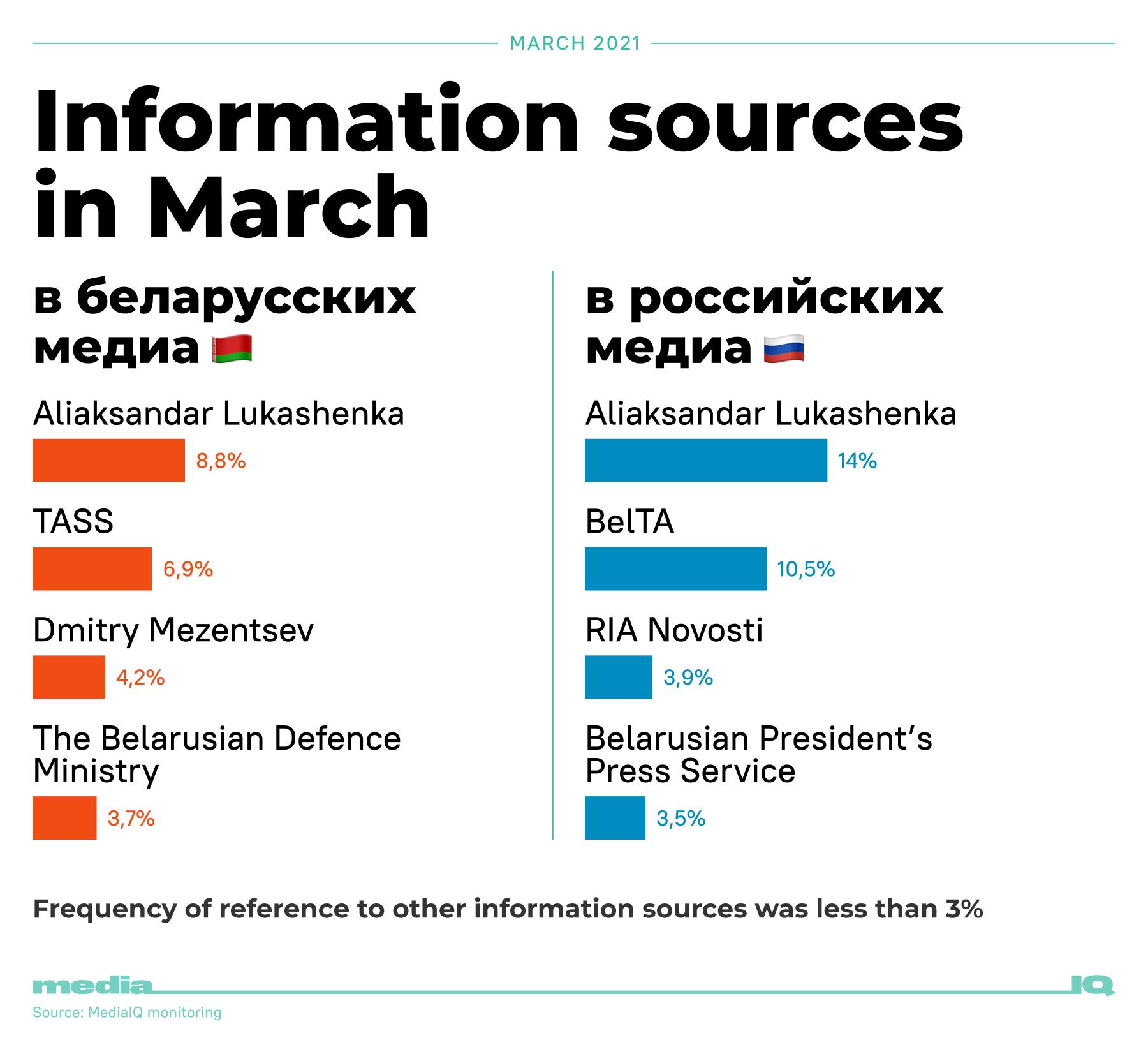
Lukashenka and state news agencies of Russia and Belarus were the most popular sources of information for the Belarusian and Russian media, respectively, when covering bilateral relations. There was also a surge in references to Dmitry Mezentsev, who gave interviews both as the outgoing Russian ambassador to Belarus and as the incoming state secretary of the Belarusian-Russian Union State.
Key figures in media articles
In respect of integration-related matters, the Belarusian Media mentioned 354 persons, and Russian, 388. We include people identified by their first and last names regardless of whether an article was directly about them. We did not assess who played a greater or lesser role in the story; the score is determined by the number of documents mentioning a particular person in the reporting period.
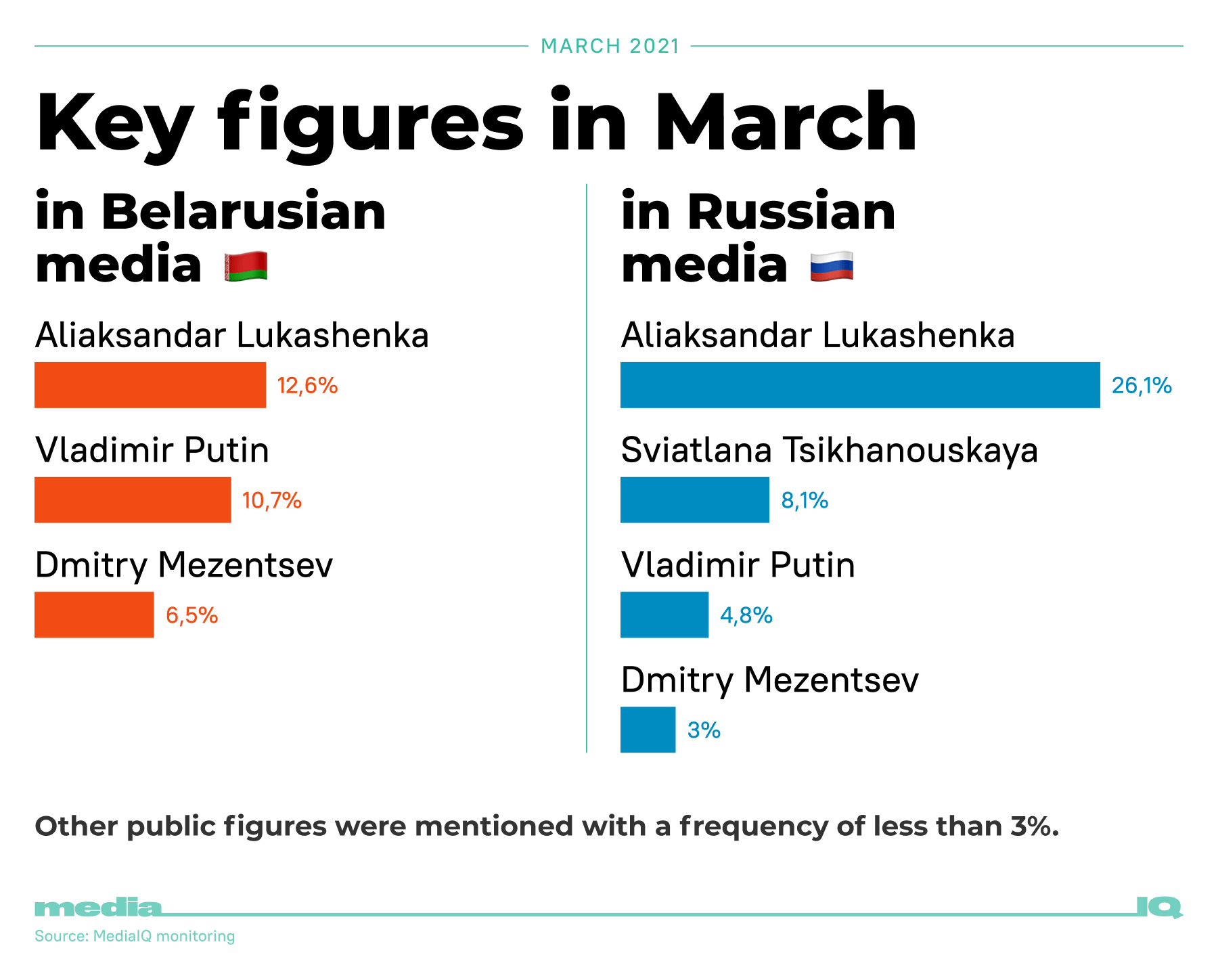
Other than usual references to Lukashenka and Putin, who were frequently mentioned in the media of both states, Dmitry Mezentsev also appeared among the most commonly quoted public figures due to the reasons described above.
Russian journalists continued to write about Sviatlana Tsikhanouskaya due to her political activity and new accusations against her by the Belarusian regime, including announcing a completed investigation against her husband, blogger Siarhei Tsikhanouski. She was also a more popular source of quotes than Putin when covering bilateral relations.
Analysis of messages communicated
In March, narrative strands in Belarusian and Russian media outlets almost did not overlap, ‘successful bilateral military cooperation, being an exception.
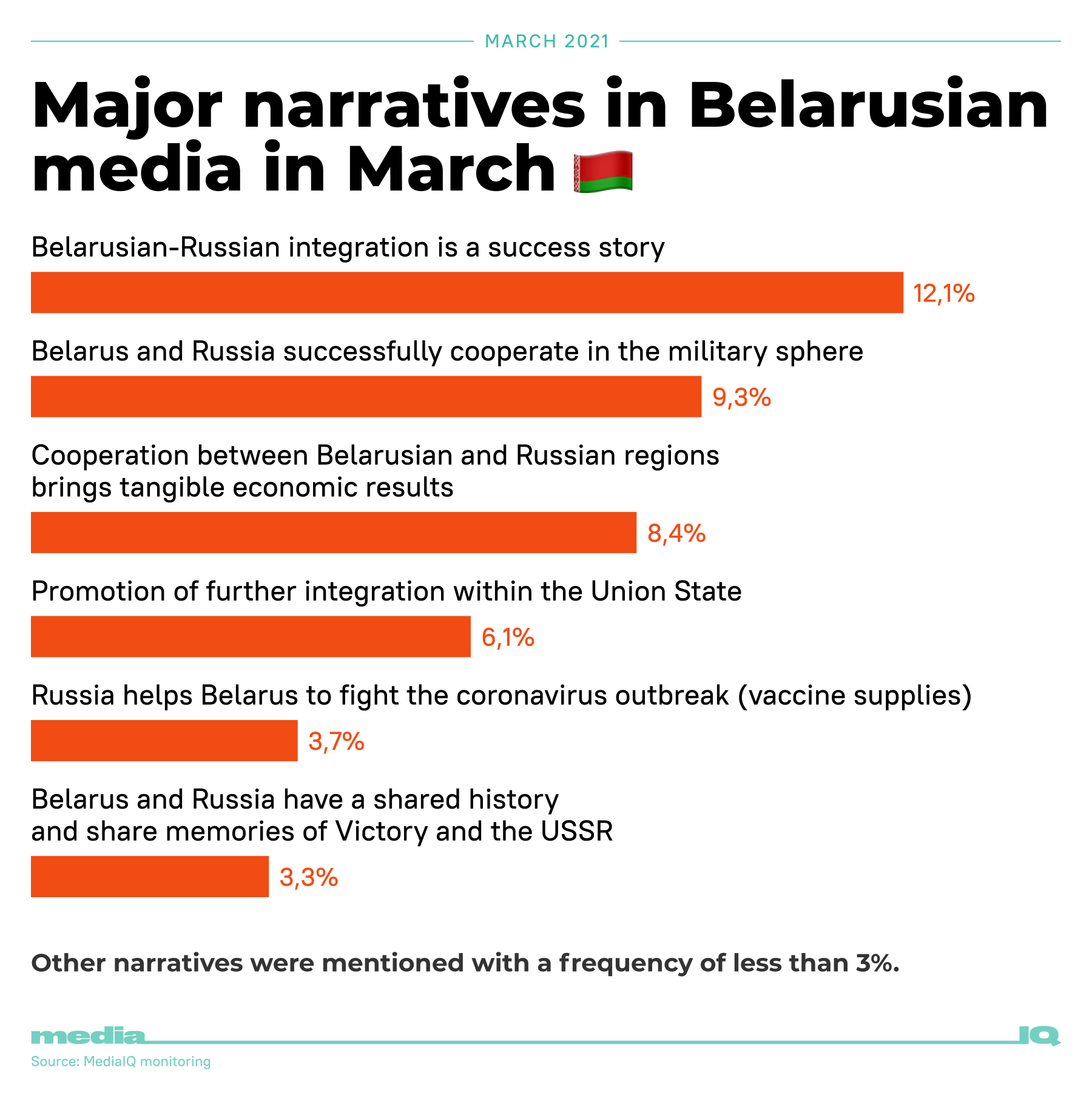
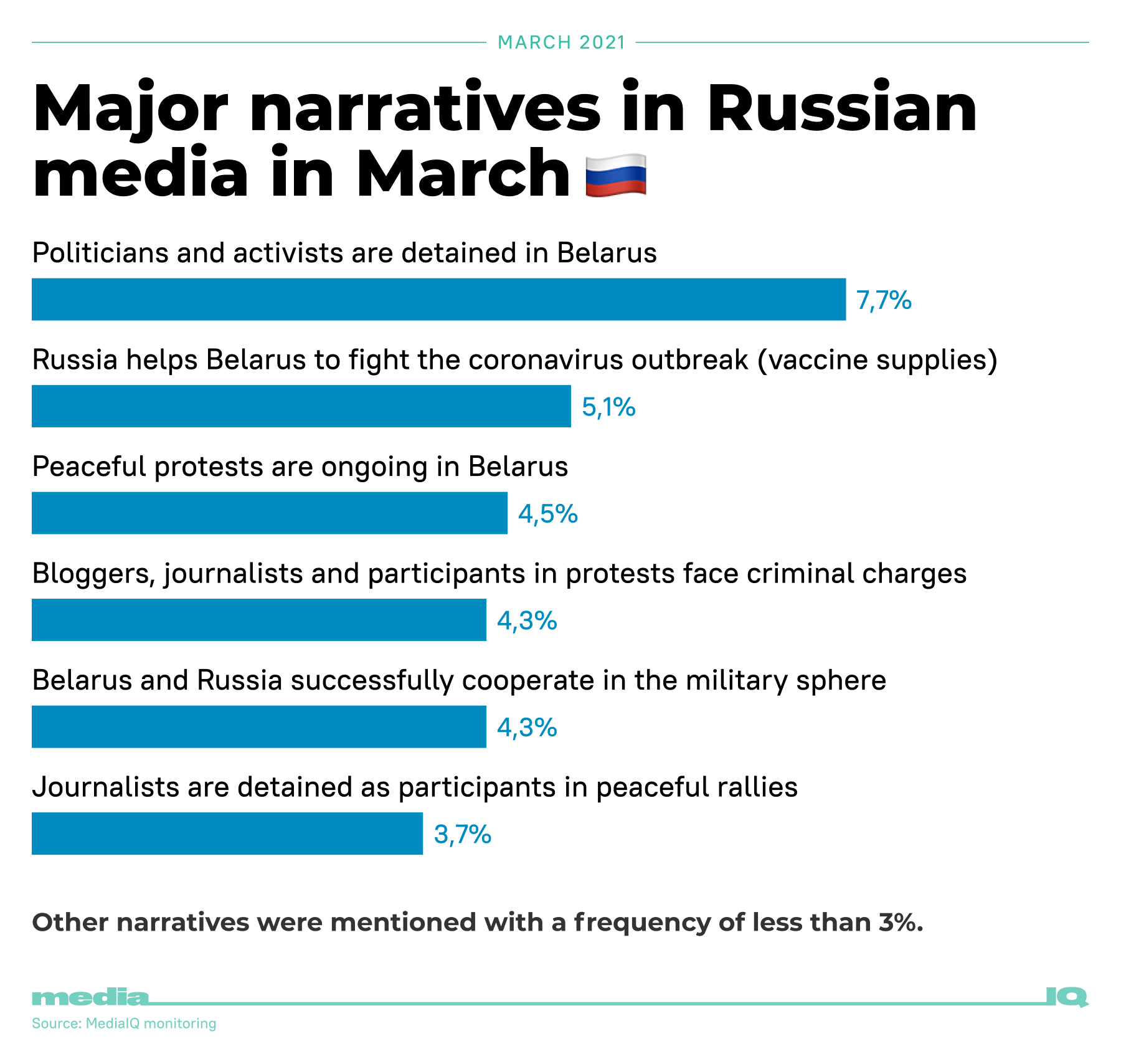
Positive narratives regarding the ongoing integration process and its future approval dominated the Belarusian media space. Manipulative references to the shared history of Belarus and Russia were among the most popular narratives promoted by the Belarusian state media.
In contrast, the Russian media most often focused on repressions against opponents of the Belarusian ruling regime and journalists.
Negative reporting prevails
Analysis of less frequent narratives grouped by broader topics shows that the Belarusian media generally positively reported about events in the neighbouring state and Russian media – adversely. Oil and gas issues lost their relevance, paving the way to Belarusian-Russian integration issues.
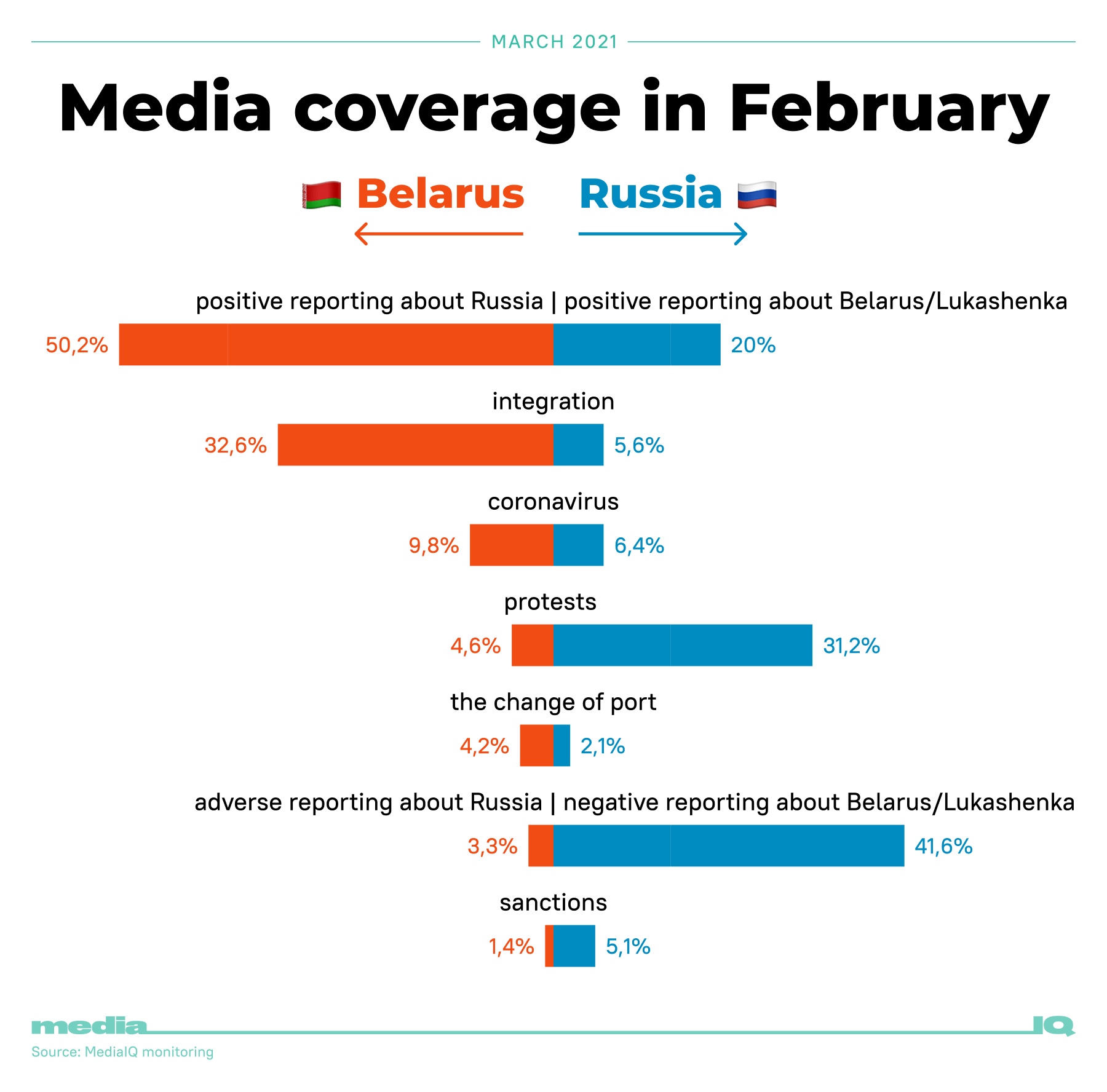
The Belarusian media, unlike Russian, paid more attention to the transfer of domestic export flows from Lithuania to the Russian ports. On this account, previous declarations became actions, providing substance for publications.
By Pauliuk Bykouski
